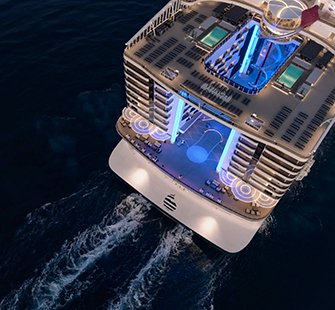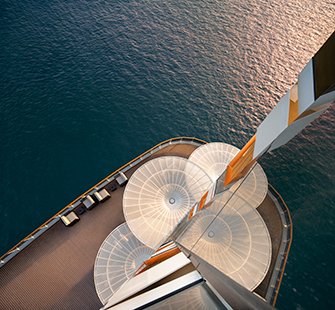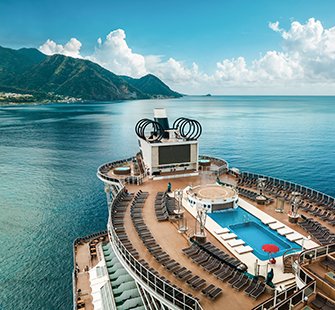Sustainability
There’s more to cruising
We are committed to taking meaningful, measurable actions that have a long-term positive impact on our guests, our employees and our planet. We continue to work towards achieving net zero greenhouse gas emissions by 2050 by investing in new technology and design, renewable fuels and operational efficiency.
Our efforts are organised in key areas of action - People, Planet, Technology, Efficiency and fuels, Responsible tourism, Supply and value chain.
EFFICIENCY AND FUELS
TOURISM
VALUE CHAIN
Social Responsibility
This section focuses on employee and guest welfare. Highlighting safety, well-being, career growth, and health standards. We aim to create a supportive environment for everyone in our business. Our commitment includes training and professional development, ensuring teams are prepared for all situations and fostering a respectful culture. Through this, we aim to support both personal and professional growth for everyone in our company.
Discover more
Environmental Protection
This section focuses on the company’s commitment to environmental protection. Promoting ocean diversity and playing our part in protecting the planet is critical to our business, and we are determined to play our role and contribute to global efforts. We identify and implement practices for pollution prevention as well as supporting initiatives that protect marine and plant ecosystems.
Discover more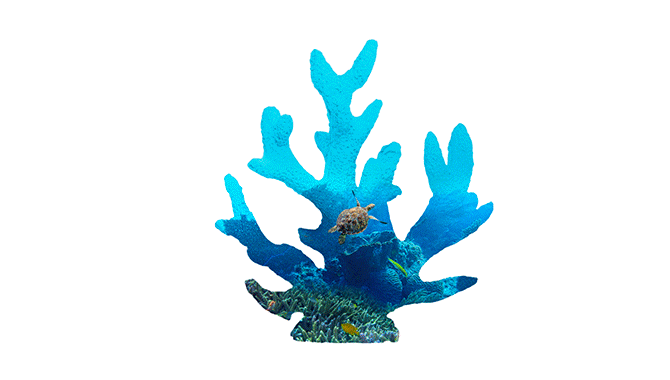
Our decarbonisation journey
This section details our efforts to decarbonise fleet operations and minimise air quality impact through advanced technologies, energy efficiency practices, and renewable fuels. We are focused on sustainable strategies that reduce emissions and support a cleaner environment, aligning our operations with broader goals for reducing our carbon footprint and enhancing air quality through innovation and responsible resource use.
Discover more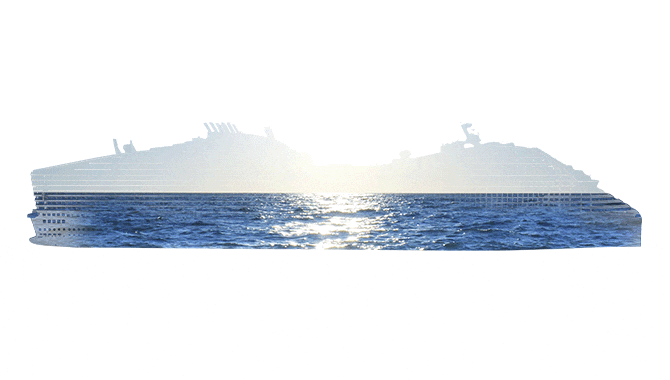
Creating positive impact
Cruises provide incredible opportunities for people to explore some of the world's most stunning and fascinating locations. We want to support the communities we visit through responsible tourism and by contributing to positive social and economic impacts, ensuring future development and growth in the local communities we visit. By partnering with local businesses, investing in community projects, and respecting cultural heritage, we aim to create connections and leave a positive impact.
Discover more
Responsible practices
Every year, we need to procure thousands of different items to run our operations, from engine parts to hand soap, crew uniforms to food and drink. Then we must ensure it's delivered to our fleet of ships, which are constantly on the move. Our procurement teams are building relationships with suppliers all over the world to satisfy our requirements and meet our procurement standards.
Discover more


Social Responsibility
This section focuses on employee and guest welfare. Highlighting safety, well-being, career growth, and health standards. We aim to create a supportive environment for everyone in our business. Our commitment includes training and professional development, ensuring teams are prepared for all situations and fostering a respectful culture. Through this, we aim to support both personal and professional growth for everyone in our company.
Discover more
Environmental Protection
This section focuses on the company’s commitment to environmental protection. Promoting ocean diversity and playing our part in protecting the planet is critical to our business, and we are determined to play our role and contribute to global efforts. We identify and implement practices for pollution prevention as well as supporting initiatives that protect marine and plant ecosystems.
Discover moreEFFICIENCY AND FUELS

Our decarbonisation journey
This section details our efforts to decarbonise fleet operations and minimise air quality impact through advanced technologies, energy efficiency practices, and renewable fuels. We are focused on sustainable strategies that reduce emissions and support a cleaner environment, aligning our operations with broader goals for reducing our carbon footprint and enhancing air quality through innovation and responsible resource use.
Discover moreTOURISM

Creating positive impact
Cruises provide incredible opportunities for people to explore some of the world's most stunning and fascinating locations. We want to support the communities we visit through responsible tourism and by contributing to positive social and economic impacts, ensuring future development and growth in the local communities we visit. By partnering with local businesses, investing in community projects, and respecting cultural heritage, we aim to create connections and leave a positive impact.
Discover moreVALUE CHAIN

Responsible practices
Every year, we need to procure thousands of different items to run our operations, from engine parts to hand soap, crew uniforms to food and drink. Then we must ensure it's delivered to our fleet of ships, which are constantly on the move. Our procurement teams are building relationships with suppliers all over the world to satisfy our requirements and meet our procurement standards.
Discover moreSUSTAINABILITY REPORTS
At MSC Cruises, sustainability is a long-term business commitment.
Browse our Sustainability reports to understand more about what we do.

MSC FOUNDATION
TOGETHER WE CAN MAKE A DIFFERENCE
As a family-owned company with a global seafaring heritage that dates back to 1675, we care passionately about the seas and have a real love of the beautiful places and inspiring cultures we take our guests to explore all over the world. This has led us to launch many life-changing initiatives over the years. The non-profit MSC Foundation was founded in 2018 to lead and coordinate these conservation and humanitarian commitments worldwide, developing the longstanding philanthropic partnerships of all the MSC Group companies and launching many new initiatives. Now a leading global corporate philanthropic organisation supporting ocean conservation initiatives, our MSC Foundation works to restore the critical balance between people and nature. Utilising our global reach and unique knowledge of the sea, we take immediate action to protect and nurture the blue planet, its peoples and our shared cultural heritage. We likewise help disaster-struck populations toward recovery and support vulnerable communities around the world to realise their full potential through education, sustainable development, and humanitarian medical programmes.


